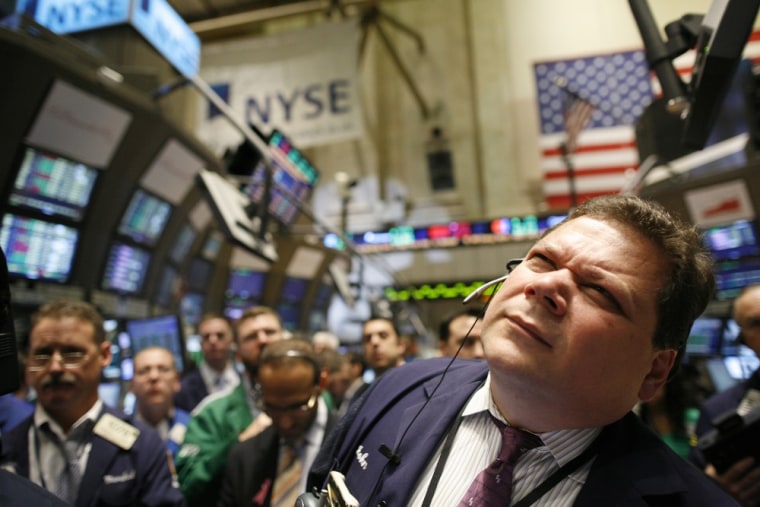Bargain hunters picked through a beaten-down stock market Wednesday, helping major indexes end slightly higher after another slump triggered by disappointing economics reports.
The market opened lower following weak reports on homes sales and durable goods orders, the latest signs that the economic recovery is losing steam.
The Dow briefly fell below 10,000 for the second straight day before moving just back above that level in the afternoon. Prior to Tuesday, the Dow had most recently traded below 10,000 on July 20.
"There are some buyers today," said Albert Meyer, portfolio manager of the Mirzam Capital Appreciation Fund. Meyer said some investors might see the market as oversold following a four-day losing streak, which took 375 points off the Dow.
Investors started the day with more bad news about the economy. Sales of new homes fell last month to the lowest level on record, the latest indication that home sales are stagnating after the expiration of a homebuyer tax credit this spring.
A separate report from the Commerce Department showed that durable goods orders grew only slightly last month, falling shy of expectations and disappointing investors who had been hoping that the U.S. manufacturing sector would continue to pick up.
Wednesday's trading after the reports epitomized the volatility that has been seen in the market in recent weeks.
Sandy Mehta, principal and chief investment officer of Value Investment Principals, said stocks are in a volatile range right now, which has been exacerbated by the seasonal summer slowdown in trading.
"We rally, we sell off. We rally, we sell off," Mehta said. "It's just the nature of the market right now."
Stocks have been hit hard in recent days because of concerns about whether the economy will fall back into recession or at least be stuck in a prolonged period of very slow growth. The Dow is heading into its fifth straight day of declines.
New home sales fell 12.4 percent in July to an annual rate of 276,600, the Commerce Department reported. That was the slowest pace on records dating back to 1963 and worse than the pace forecast by economists polled by Thomson Reuters. A day earlier, the National Association of Realtors said sales of existing homes, a far greater proportion of the housing market, fell to a 15-year low in July.
According to preliminary calculations, the Dow Jones industrial average rose 19.61, or 0.2 percent, to 10,060.06 in afternoon trading.
Broader market barometers also rose. The Standard & Poor's 500 index rose 3.46, or 0.33 percent, to 1,055.33, while the Nasdaq composite index rose 17.78, or 0.84 percent, to 2,141.54.
The fear among investors is that if the economy continues to worsen, corporate earnings will start to weaken, just as economic indicators have.
"The worry is, if the economy looks worse, maybe companies start ratcheting down" their earnings forecasts, said Russell Croft, portfolio manager at Croft Leominster Investment Management. "It's still a very uncertain time."
Interest rates backed off their lows for the day as investors looked for bargains in the stock market. Rates dropped sharply after the housing and durable goods reports Wednesday morning.
The yield on the 10-year Treasury note fell as low as 2.42 percent during morning trading before climbing back to 2.53 percent. Its yield touched a level not reached since January 2009, when the stock market was heading toward its lowest level in 12 years
Its yield is helps set interest rates on mortgages and other consumer loans.
Despite the ultra-low borrowing rates, home sales have been weak since a home buyer tax credit expired at the end of April. High unemployment has kept people from buying homes, and banks still reeling from the crisis in the mortgage-backed securities market have been cautious in making new loans.
Overseas, Japanese shares fell again after the yen hit a new 15-year high against the dollar and a nine-year high against the euro. The high yen hurts profitability at major Japanese exporters. Japan's Nikkei stock average fell 1.7 percent. European markets were also lower.
